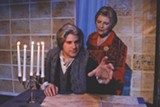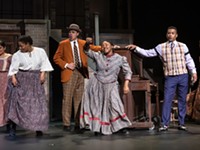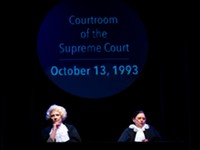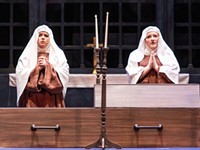[
{
"name": "500x250 Ad",
"insertPoint": "5",
"component": "15667920",
"parentWrapperClass": "",
"requiredCountToDisplay": "1"
}
]
Intricate, delicate, and lovely are possibly the three words that best describe "33 Variations," the drama currently on stage at Blackfriars. The play, written by Moises Kaufman ("The Laramie Project," "I Am My Own Wife") and directed by John Haldoupis, is a nuanced look at the way people relate to one another, refuse to relate to themselves, reject human frailty, and ultimately come to grasp simple truths. It's a show with many moving parts, and while not all of them are executed with equal strength, the results are still evocative and thought provoking, and certainly worth watching.
The show concerns two separate but related stories. The main protagonist is Katherine Brandt, a musicologist about to depart on a trip to Bonn, Germany, to research her musical icon, Ludwig van Beethoven. Specifically, Katherine is interested in discovering why such a musical genius spent years obsessed with writing the 33 compositions that became known as the Diabelli Variations, aural meditations on a simple waltz that she routinely describes as "mediocre." Even as she embarks on the journey of her professional life, Katherine wrestles with the greatest challenge of her actual life: she has been diagnosed with amyotrophic lateral sclerosis (ALS), and the disease is ravaging her body at an aggressive rate.
As we follow Katherine's story, the show flashes back in time to show us its version of why Beethoven — nearing the end of his life, drowning in debt, and growing increasingly deaf — kept going back and back to Diabelli's waltz, to the detriment of more lucrative and ambitious creative endeavors.
The show switches between the modern day and the early 19th century, with characters from both time-period ensembles sometimes sharing the stage — and even actual lines — at points where the stories and themes intersect. It's an interesting structure, and the insightful but never obvious language by Kaufman and thoughtful directing choices by Haldoupis make the most of the material and the Blackfriars stage.
The modern-day cast is the core of the show, and it is anchored by Patricia Lewis as Katherine. Lewis is unquestionably one of our great local acting talents, and her performance in "33 Variations" is essentially flawless. Her line readings are thoughtful and honest, and always, always totally in character. But her physical acting here is astonishing. As Katherine becomes increasingly stricken with ALS, Lewis herself seems almost to shrink in response, wasting away before our eyes, but still fighting all the time. There is not a moment of her performance that feels forced, or anything less than honest, including the less-than-flattering exchanges with Katherine's estranged daughter. The final monologue that she delivers to close the show is powerful yet restrained.
Lewis is joined by a great supporting cast in the present-day sections of the play, and there is some terrific partner work throughout their scenes. The evolving relationship between Katherine and her daughter, Clara (Ruth Bellavia), will feel familiar to anyone with mother/daughter issues. The scenes between Clara and Nurse Mike (Adam Petzol) are awkwardly, sweetly romantic. And the exchanges between Katherine and German librarian Gertie (Vicki Casarett in a largely comedic role) are frequently hilarious.
Unfortunately, the 19th century cast does not fare as well. Jeff Siuda as Beethoven's associate, Anton Schindler, is the most successful, his exaggerated mannerisms best realizing the grander acting that defines almost all of these scenes. Ross Amstey is only occasionally believable as Beethoven. He is at his best when accessing the composer's more impish impulses, but often lacks energy. This is true of almost every exchange between him and Terry Browne as Diabelli. It's telling that Amstey's best scene is the one he shares with Lewis toward the end of the play.
Director Haldoupis clearly found inspiration in the classical-music subject matter, weaving in visual and aural details throughout the piece. Several of the Diabelli Variations are performed live throughout the show by pianist Julie Covach. The show closes with the cast dancing a minuet (a work that begins with a dance should end with a dance). And the two giant sliding doors that define the set are covered top to bottom with sheet music. (Speaking of the set, designer Haldoupis smartly combines traditional construction with countless digital projections that add to the story rather than detract from it. Blackfriars has been heavily using projections since at least its production of "The Who's Tommy," and no other theater in the area uses them more effectively.)
The remarkable thing about "33 Variations" is that even as it deals with some grim subject matter — the inevitable failing of our physical body, and our mind's inability to come to grips with it — it is also sometimes uproariously funny and life affirming. And I mean that last bit in the best way. The show is never sappy, or even melodramatic. Like the Diabelli Variations themselves, it explores the various facets of human reality and relationships in relatable and sometimes unexpected ways.
Speaking of...
Latest in Theater
More by Eric Rezsnyak
-
“Doctor Who” Series 8: “Into the Dalek”/“Robot of Sherwood”
Sep 7, 2014 -

“True Blood” Series Finale: “Thank You”
Aug 24, 2014 -
“Doctor Who” Series 8, Episode 1: “Deep Breath”
Aug 24, 2014 - More »









